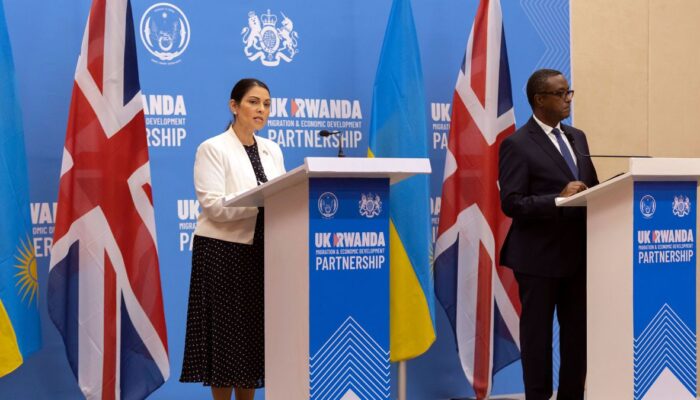What Have We Become?: The UK Begins the Offshore Processing of People Seeking Asylum
“What has become of us when it is we who now commit such crimes?”.
The Australian novelist Richard Flanagan posed this question in his Foreword to Behrouz Boochani’s No Friend But The Mountains. Boochani had been imprisoned on Manus Island, Papua New Guinea in 2013 by the Australian government for attempting to enter Australia by boat to claim asylum. His book is a profound and disturbing account of the slow brutality of Australia’s extra-territorial processing of refugees. Boochani wrote the book via text messages in Farsi on a contraband phone which were then translated into English and edited by his collaborators. It depicts, through poetic language and imagery, the systemic torture inflicted by the Australian government on those seeking sanctuary. It details the anxiety and prolonged boredom of prison life as well as moments of cruelty. It speaks of the lives put on hold by an oppressive border regime and the lives cut short through violence, suicide and otherwise treatable medical issues. When Richard Flanagan asked his question, he was relating the Australian prisons on Manus Island and Nauru to the stories told by his father about life in a Japanese POW camp during World War 2. Now, for Flanagan, it was the Australians who were inflicting suffering. Yet, as Boochani and his collaborator Omid Tofighian make clear in their writings, the prisons on Manus and Nauru did not spring out of nowhere. They are part of legacy of colonialism, racism and violent border policies that have shaped Australia into the present. For Boochani and Tofighian, the prisons are iterations of a wider ‘Kyriarchal System’ – a concept first introduced by the feminist theologian Elisabeth Schüssler Fiorenza to describe interconnected and overlapping social systems used for the purposes of domination, oppression and submission. The Kyriarchal System ‘creates hate and forces people to hate each other’, as Boochani states.
Last week, the UK government announced a deal with Rwanda to process people seeking asylum in the UK in the central African nation. The details of the agreement are vague and murky, but speeches by the Home Secretary Priti Patel and Prime Minister Boris Johnson indicate that those who have entered the UK without authorisation will be flown 7000 km to have their claims assessed. If they are granted refugee status they will remain in Rwanda as refugees rather than return to the UK. It’s a pilot programme with £130 million given to the Rwandan government and the UK will cover operational costs. However, if expanded the costs could increase to £1.4 billion a year according to the Refugee Council. The plan has been decried as unworkable, costly, inhumane and against international law. Israel made a similar agreement with Rwanda in 2014 only for the majority of the people to abscond once removed to Rwanda and make their way towards Europe. Whether this will happen again or prisons will be constructed for those transported from the UK remains to be seen.
It should come as no surprise that the UK has instituted the off-shore processing of asylum seekers. The practice has been mooted by different governments, both Labour and Conservative, over the past few decades. The last 40 years have also seen increasing restrictions placed on asylum seekers in the UK. This has ranged from the removal of the right to work, the introduction of indefinite detention and a dispersal policy where people are moved to areas outside London and the south east of England while their claims are processed. Under the New Plan for Immigration launched in 2021, asylum seekers arriving unofficially to the UK will only be offered temporary protection visas if their claims are accepted, creating two tiers within the UK’s refugee system based entirely on a person’s mode of arrival.
In 2012 the rhetorical veneer of the UK being a welcoming and hospitable place for asylum seekers was dropped as the Conservative-led government introduced its ‘Hostile Policy Environment’ against people without permission to remain in the UK. The Official Home Office Twitter account posted images of migrants being arrested with the hashtags #immigrationoffenders and #immigrationbill. Adverts were taken out in Black, Asian and predominantly minority ethnic newspapers telling ‘immigration offenders’ to leave the country or face arrest and vans were driven around multi-ethnic areas of London with billboards reading “In the country Illegally? GO HOME OR FACE ARREST’. As Jones et al stated, this marked a turning point within the immigration discourse as the UK government had adopted the same rhetoric as far-right racists. This media assault was combined with a legislative agenda intending to isolate irregular migrants by restricting access to bank accounts, healthcare and the housing market while increasing criminal penalties for working or employing people without permission. The defining moment of the Hostile Environment was the Windrush Scandal in which Commonwealth Citizens primarily from the Caribbean with the right to remain in the UK were suddenly denied access to healthcare, housing and employment and were wrongfully arrested, detained and deported.
The aggressive language of the Hostile Environment has since been dropped, but the hostility remains as the screws tighten on irregular migrants. The agreement with Rwanda was accompanied by posters with a sickly upbeat corporate aesthetic that masked a dark reality. The announcement was also accompanied by attacks on the legal profession by Boris Johnson as he accused ‘activist lawyers’ of defending migrants and frustrating deportations.
In certain respects, the announcement is an example of what Jones et al refer to as a ‘state performance’. Such performances are an attempt to deter migrants and convince sceptical sections of the public that immigration is ‘under control’. Yet, they are not always clear, coherent or effective in achieving their stated aims. Whether people are deterred from claiming asylum in the UK or racist elements within society will be satisfied remains to be seen, but both are unlikely considering previous history. In the end it seems that the agreement is simply a means to punish people for the act of claiming asylum in the UK.
Manus Prison was declared illegal by the Papua New Guinea Supreme Court in 2016 and the prison was closed the following year. Practically, this meant that the Australians abandoned the prison and people were relocated to other facilities in Manus or Port Moresby. During Operation Sovereign Borders around 3,000 people were detained on Manus and Nauru. Some would be granted refugee status in countries outside Australia. Some remain in Papua New Guinea and some were relocated to detention centres and communities in Australia. Some would die on Manus Island and Nauru. Behrouz Boochani escaped from Manus in 2019 and now resides in Christchurch, New Zealand.
The prisons on Manus and Nauru are now recent ruins [pdf] of a cruel border regime. They are abandoned, crumbling spaces. They reflect the ruination of the lives of many of those who passed through. The UK is now on course to create similar ruins. We have to ask ourselves ‘what have we become?’. The answer entails a reckoning with decades of anti-immigrant rhetoric, policy and legislation in the UK and wider histories of colonialism, racism and xenophobia. The answer entails a confrontation with the Kyriarchal System.

